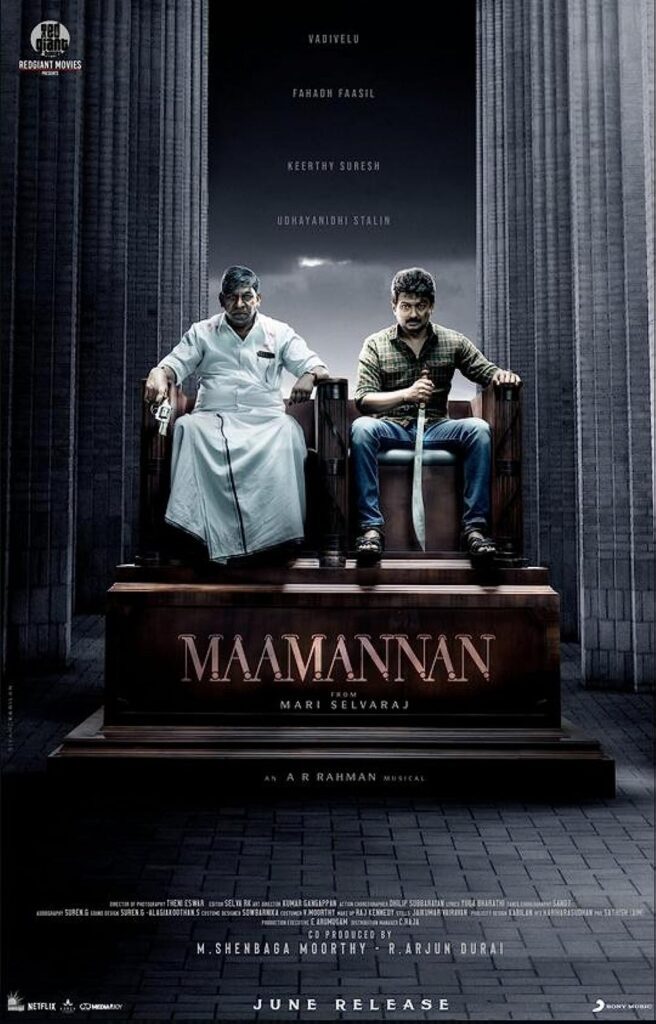Maamannan
Introduction
Thank God It Is Friday and the new releases have started pouring in! With that, I finished watching one of my most anticipated Tamil films Maamannan which is now streaming on Netflix. The film is directed by Mari Selvaraj and if you are even remotely aware of the brand of films that he is known for, then you would be aware that there aren’t many filmmakers who can highlight the issues of caste and creed as well as he does! Films like Pariyerum Perumal and even Karnan has this raging undertone of the issues of caste and the ultimate retaliation, all packaged in a thought provoking yet firecracker of an entertainer that does engulf you in the spirit of the film wonderfully well. So when I did get to know about Maamannan and it being a political thriller set against the backdrop of casteism, I was quite looking forward to it. Unfortunately, I did miss out on its theatrical release and since then had kept an eye on its OTT release. And finally, I did get my chance to watch Maamannan on Netflix. So then does Maamanan manage to impress, lets find out.
Story & Screenplay
Maamannan follows the story of a father and son duo belonging to the oppressed community who are forced to take a stand against the arrogant son of a politician. Will they be able to hold ground? The story here is absolutely raging with seldom simmering moments that definitely does have a voice of its own. This may not be as effective as Selvaraj’s previous works but it still holds good ground while conveying its point across. The screenplay standing at a shade above 150 minutes did seem to be slightly stretched but it does have ample of moments that makes for a compelling watch.
The drama does open with a visual of the protagonist rearing pigs. This one image was enough to establish the fact that he did belong to the oppressed community. Elsewhere, his father, now a local MLA, is still being questioned about his son’s actions. This further highlights the point that even a position of power was not enough to keep the caste issues of the family away. You are also introduced to the antagonist, an arrogant and impulsive man who has kept wild dogs as pets. And when one of his dogs does not obey his command(loses a race), he bludgeons it to death. This represents two things – the man holds an intimidating position in society while also not shying away from harming one of his own! This was quite an effective beginning given that you aren’t acquainted with the baggage of the principal characters.
The proceedings are engrossing and interesting given that the viewers are further acquainted with the equations between the characters as the drama does unfold. While the love angle continues to remain inconsequential, a brief flashback, shot in black and white paints a clearer picture about the equation that the father and son share while not being on talking terms for ages. That sequence was powerful, and it does hit you right where it hurts you the most. A series of events(in the current timeline) leads to a face-off between the protagonist and the antagonist, and those set pieces are very well defined. The energy in those scenes start on a lower chord while tactfully making its way to the higher decibels through the bouts of simmering tension. There is an undercurrent of the issues related to casteism throughout which eventually becomes the driving force for the rest of the drama to follow.
The drama is also represented by the two sets of animals – the pigs signifying the oppressed community, and the wild dogs signifying the upper caste community. The use of these animals is prevalent throughout the narrative including and gut-wrenching action sequence that is heartbreaking. All the emotions hit home wonderfully well in that scene which is in many ways representative of the issues of current times.
I absolutely enjoyed the face-offs between characters but missed the subtle nuances of politics in the second hour. The approach was always the in your face kinds, and so there weren’t any shifting equations between characters which would have contributed in making the drama cerebral. But the obstacles resulting in the form of action set-pieces are brutal and hard-hitting that compensate for the lack of subtlety. The drama continues to remain predictable but the raging tension between the parties continues to dominate the proceedings. However, the final act for me didn’t quite work as it felt too simplistic in its approach wherein I had expected a final showdown between the characters. Yet, the screenplay is very well written and makes for a powerful watch with a great message at the end that everyone is born equal, and hence should continue to have equal rights.
Dialogues, Music & Direction
The dialogues are powerful but they the drama majorly relies on images that ensures that the proceedings do not get preachy. The music works very well through the narrative with the maestro AR Rahman providing different soundtracks that go well with the vibe of the drama. The BGM works well in enhancing the impact of various scenes.
The cinematography is brilliant balancing the flashback scenes with a terrifying tone of black and white. The aerial shots are beautifully captured but there is also a lot of thought given to various scenes. For instance, there is a shot featuring a mob getting violent towards the end while there is a statue of The Buddha that represents peace. Such contrasting emotions are very well shot. The action sequences are gory and the makers provide no respite in those scenes which are filled with blood. The editing is crisp too. Director Mari Selvaraj is not at his absolute best here. But the good thing is that his ‘not-so-best’ version is miles better than some of the best works of other directors. The man just knows his craft so well, tactfully creating moments of impact right throughout the film that definitely makes for an engaging watch with a thought provoking message that lingers on long after the film has ended. The direction is pretty good here.
Performances
The performances are excellent here. Lal as the CM Rajan is first rate and pulls off his character with dignity. Keerthy Suresh as Leela does a good job but her character doesn’t get enough scope to fully blossom. Vadivelu as Maamannan was my favourite character that had such a wonderful character arc from being helpless to finally finding his voice. It was a thought provoking and a very effective performance that made for a lasting impact.
Fahadh Faasil yet again proves while he is the finest actor doing the rounds currently. As Rathnavel, he is arrogant and aggressive, showing no remorse to anyone around. And he makes his eyes talk yet again in a character that I would have associated with Shine Tom Chacko. The contrasting emotions are representative of his duel nature – touching the feet of an oppressed leader just so that he doesn’t lose only to later bludgeon him to death when things don’t go as planned. The finest in the business hits home yet again! Udhay Stalin as Veera does a good job too tactfully placing his rage into action. His scenes with FaFa take the cake in what was a commendable act by Udhay.
Conclusion
Maamannan is a raging political thriller with undertones of casteism that makes for an impactful watch. Not the best from Mari Selvaraj but still powerful nevertheless. Available on Netflix.




